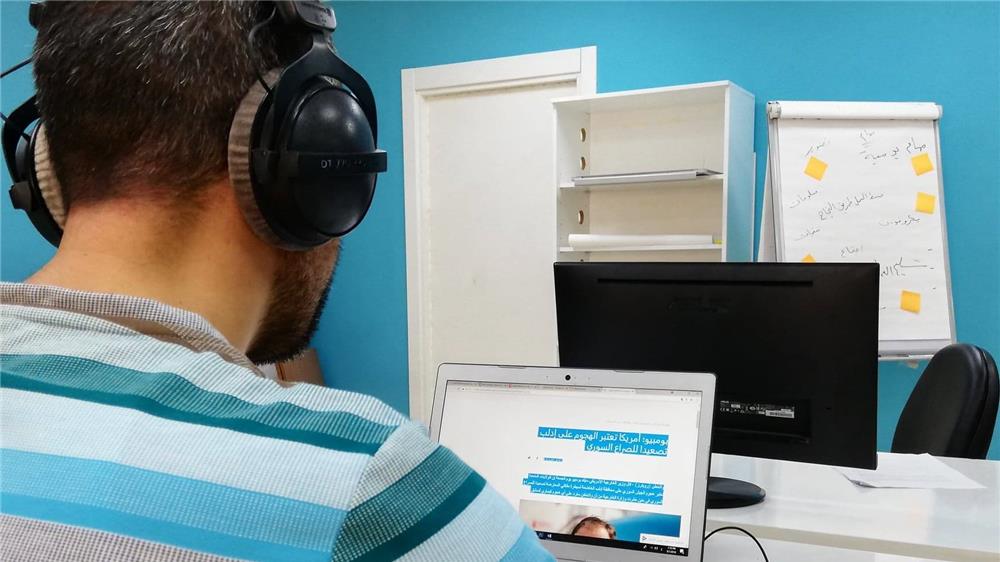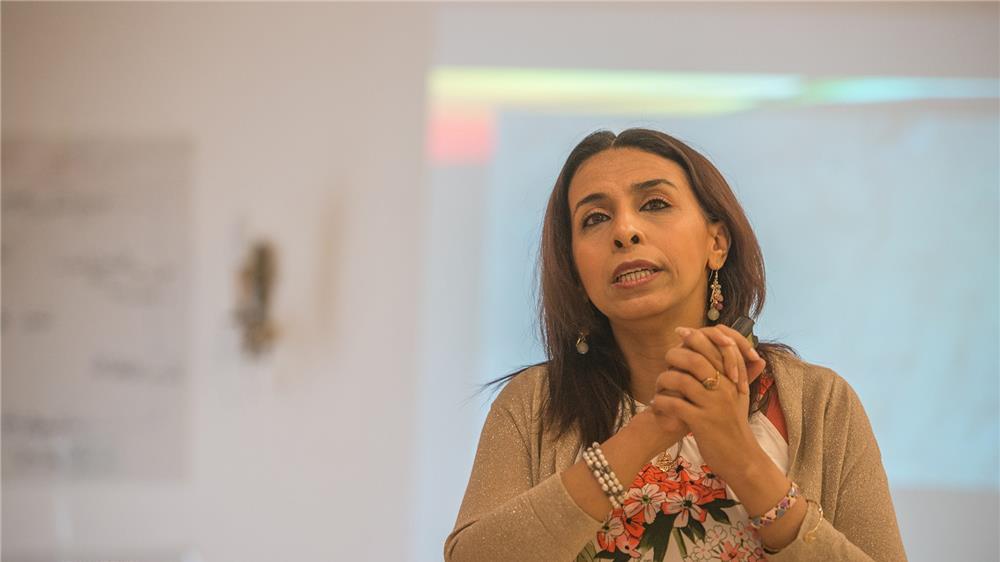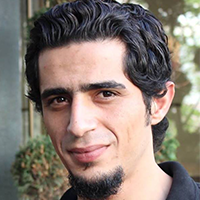"نستعرض يومياً مئات الأخبار لنختار منها ما يمكن أن يُنشر، ومن ثم نرتب مدى أهميتها لتُناقش خلال الاجتماع الصباحي اليومي مع إدارة التحرير إلى أن ندخل في مرحلة البحث عن مصادر للحصول على مزيد من التفاصيل لهذه الأخبار".
مهمة يومية تقع على عاتق المحرر الصحفي السوري أحمد نذير وزملائه أثناء رصد الأخبار، حيث يباشر بنقل الأخبار الهامّة من وكالات الأنباء العالمية ويحصل على تصريحات متعلقة بهذه الأخبار من ذوي الاختصاص ليحولها إلى أخبار صالحة للنشر.
الصحفي أحمد يعلق على موضوع رصد الأخبار قائلاً: "هناك أخبار تكون وكالات الأنباء وبخاصة الشهيرة والدولية منها أسرع بنقلها، بالتالي يعتمد المحرر عليها في نقل المعلومات".
وحول المعلومات الواردة في المؤتمرات الصحفية والبيانات الصادرة عن مكاتب المسؤولين وأصحاب القرار، يجيب "تكون المعلومات هنا واحدة وتنقل كما هي، ويكون دور المحرر هنا وضع السياقات المناسبة التي تضع تلك المعلومات في الإطار اللازم والمناسب لسياسة الوسيلة الإعلامية".
ويضيف "لا يمكن التخلي عن نقل الأخبار من وكالات الأنباء العالمية أو وسائل التواصل الاجتماعي بالمطلق، في وقت يجب الاعتماد أكثر على مراسلين ومصادر محلية موثوقة لاستقاء الأخبار".
وتبرز المشكلة الأكبر لدى المحرر أثناء رصد الأخبار في الحصول على معلومات موثوقة ودقيقة والتمحيص في موثوقية المصادر، خاصة بعد التدفق الهائل للمعلومات عبر وسائل التواصل الاجتماعي، وبالتالي اعتماد المعلومات الواردة ونشرها في الوسيلة الإعلامية، حسب أحمد.
ويضطر صحفيون سوريون إلى رصد الأخبار المحلية أحياناً دون التوسع بمعالجتها بسبب كمّ المعلومات الهائلة المتدفقة يومياً سواء على الإنترنت، كالتصريحات السياسية حول سوريا والبيانات والمؤتمرات والاجتماعات، أو في الميدان كالأحداث العسكرية والميدانية والاجتماعية.

التحقق من المصادر
يعتبر صحفيون أن التحقق من المصادر أثناء رصد الأخبار وخاصة ما يصلح منها ليقع في دائرة "السبق الصحفي"، أهم النقاط التي لا بد على محرر الأخبار أن يهتمّ بها.
وتحمل بعض الأخبار أهمية في محتواها، ومن الممكن أن تحدث تغييراً في أحوال الناس الذين يقعون ضمن المجال الجغرافي المستهدف من قبل الوسيلة الإعلامية، الأمر الذي ينقلها إلى المرتبة الأولى من حيث الأهمية بالمقارنة مع الأحداث الجارية في ذات الوقت.
ورصد مثل هذه الأخبار بسرعة قد يساهم في خلق مشكلة أمام المحرر، خاصة إن كان مصدره عبارة عن مصادر أو تسريبات غير رسمية.
في المقابل، يحصل أن تنشر وكالة أنباء عالمية خبراً يحمل تفاصيل مغلوطة، وهذا ما حصل، أواخر الشهر الرابع من عام 2016 مع شبكة BBC عربي عندما نشرت خبراً يفيد بمقتل 44 شخصاً في قصف فصائل المعارضة لمناطق في حلب تقع تحت سيطرة النظام السوري.
ولم يدم الخبر طويلاً حتى اعتذرت الشبكة عن نشره، وقالت: "تضمنت عناوين نشرة أخبار السابعة صباحاً لتلفزيون بي بي سي لقطات لمناطق المعارضة على أنها تابعة للحكومة، نعتذر عن هذا الخطأ".
وتعتمد آلاف وكالات الإعلام المحلية في أنحاء العالم على نقل الأخبار من وكالات أنباء عالمية باعتبارها لا تنشر إلا ما هو صحيح وحصري، وإن نُشر خبر كاذب في إحدى منصات هذه الوكالات، فهذا يعني رصده من قبل عدة وكالات إعلامية أخرى وانتشاره على نطاق واسع، وإن لم يكن له أساس في الواقع.
عبير السعدي، الصحفية المصرية الباحثة في جامعة دورتموند الألمانية في شؤون الإعلام، تقول لمجلة الصحافة: "الجزئية المهمة أثناء رصد الأخبار هي التحقق من الحدث، لا بد هنا أن نقف مع أنفسنا وأن نفكّر قبل نشر الخبر، وكلما زادت خبرة الصحفي الإعلامية، قلّت مدة هذه الوقفة ولم تستهلك منه الزمن الكثير".
وتضيف "أدوات التحقق من صحة الخبر تكمن في سؤال الصحفي نفسه، ما هذا الخبر؟ وما توابعه؟ ومن الأشخاص الذين يستطيع التواصل معهم للتحقق من الخبر؟".
الإنترنت لا يعتبر دائماً مرجعا
يعتمد العديد من الصحفيين في انتقاء الأخبار من أجل نشرها على الوسائل الإعلامية التي يعملون بها على الإنترنت وشبكات التواصل الاجتماعي.
وتؤكد السعدي أن "الإنترنت لا يعتبر مرجعا، فهو البداية لكنه ليس النهاية، ونقل الخبر من الإنترنت يتزامن مع تطور مهنة الإعلام، فأي شخص يملك هاتفاً نقالاً وشبكة إنترنت، يمكن أن يكسر مسألة السرعة في نشر الأخبار".
وتضيف "نحن الصحفيون علينا التركيز على أكثر ما يميزنا، فلا بد من تحقيق إضافة مهنية للخبر، وهي التي تجعل المهنة مطلوبة وتفتح سوق عمل، الصحفي بالنهاية يتقاضى أجراً، وهذا لن يدفع ما لم يقدم قيمة مضافة للوسيلة الإعلامية التي يعمل بها".
وكلما كان لدى المحرر الصحفي مصادر متعددة وشبكة علاقات متميزة، يسهل عليه موضوع رصد الأخبار ويحصل على إجابات من أهل الاختصاص.
وتنوه الصحفية المصرية على أهم النقاط المتعلقة بالرصد الإخباري، خاصة فيما يتعلق بأخلاقيات المهنة، حيث تقول: "من الواجب احترام أخلاقيات المهنة كالملكية الفكرية على سبيل المثال، فلا يمكن أن تنقل صحفية من مؤسسة صحفية وتُعدِّل على الحبر ويُعاد نشره من جديد دون ذكر المصدر، وهذا للأسف يحصل في عدد كبير من المؤسسات الإعلامية التي تتناقل أحياناً نفس الخبر، ويعتبر ذلك عدم احترام لجهد الصحفي".
وتتابع "القراء باتوا يستطيعون التفريق بين الوسائل التي تتناقل الخبر، وهنا سيعرفون الوسيلة الإعلامية التي نقلت الخبر من أخرى، وهو أمر له مردود سيء على الوكالة والصحفي الناقل للخبر أثناء عملية الرصد".

ولا تقول السعدي للصحفي ألا ينشر الخبر، بل تُناقش كيفية نشره؛ فمن الأفضل، حسب رأيها، أن يكون هناك رقابة أخلاقية لمعرفة توابع ما يُرصد من الأخبار، مؤكدة أن الأبحاث العلمية تقول إن الصحفي يلجأ للمصادر التي تتعاون معه بشكل سريع، ما يُحدثُ في بعض الأحيان نوعاً من الخلل. ففي نهاية المطاف، تواصل الصحفي مع مصدر وحصل على إجابات، بيد أنها ليست أفضل الإجابات. وتشدد السعدي على ضرورة وجود علاقة بين المصدر والموضوع والتخصص.. "وليت الزملاء يبحثون عن المصادر المتخصصة بالخبر وليس فقط المصادر المعلبة والجاهزة والسريعة بالتجاوب"، حسب قولها.
ضبط النشر
من الملاحظ أن وسائل الإعلام تغطي أحياناً مناطق جغرافية واسعة تفوق استطاعتها الممثلة بتغطية نفقات صحفيين في هذه المناطق، الأمر الذي يجعلها تضطر للاعتماد على رصد الأخبار في غالب الأحيان.
ويقتضي النشر المعتمد على رصد الأخبار اتباع عدة عوامل قبل أن يقدم الصحفي على تحرير الخبر وتحويله لصيغة قابلة للنشر في الوكالة التي يعمل بها.
وتنصح الصحفية عبير السعدي الصحفيين بالإجابة على بعض الأسئلة قبل اتخاذ القرار ونشر الخبر، وهذه الأسئلة:
هل نشر هذا الخبر مهم للجمهور وفيه مصلحة عامة؟
هل هذا النشر أو الخبر أو الصورة فيها ضرر لشخص ما؟
هل هناك بدائل لهذا النشر؟
هل يمكنني تقليل الخطر في هذه الحالة على هذا الشخص إن أدركت أن نشر الخبر يضر المتحدث؟ فنقول "مصدر مطلع" رغم أن السعدي لا تحبذ الاستعانة بهذا المصطلح.. "لكن أحيانا نضطر لاستخدامه ببعض الحالات"، على حدّ قولها.
ومن المتعارف عليه في غرف الأخبار الاجتماع التحريري الصباحي الذي يتم عبره رسم خارطة الأخبار التي ستتناولها الوكالة وترتيب الأحداث وتوزيع المهام بين الصحفيين.
لكن في معظم هذه الوكالات لا يُعقد اجتماع مسائي كي يتبادل الصحفيون تجاربهم ويستفيدوا من المواقف التي تعرضوا لها أثناء العمل ورصد الأخبار واستضافة ذوي الاختصاص.
ولا يمكن لأي محرر صحفي أن يستغني عن رصد الأخبار إلا في حالات معينة، كأن يكون موظفاً في وسيلة إعلامية تقتصر على نشر القصص الصحفية أو التحقيقات الميدانية أو التقارير المصورة، أو ما ليس له علاقة بنشر الأخبار العاجلة.








































